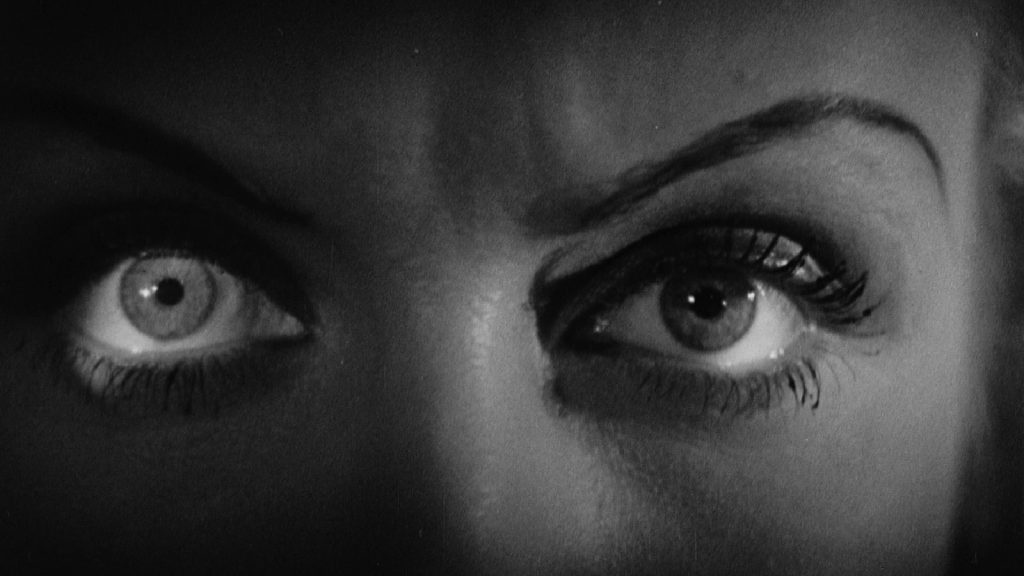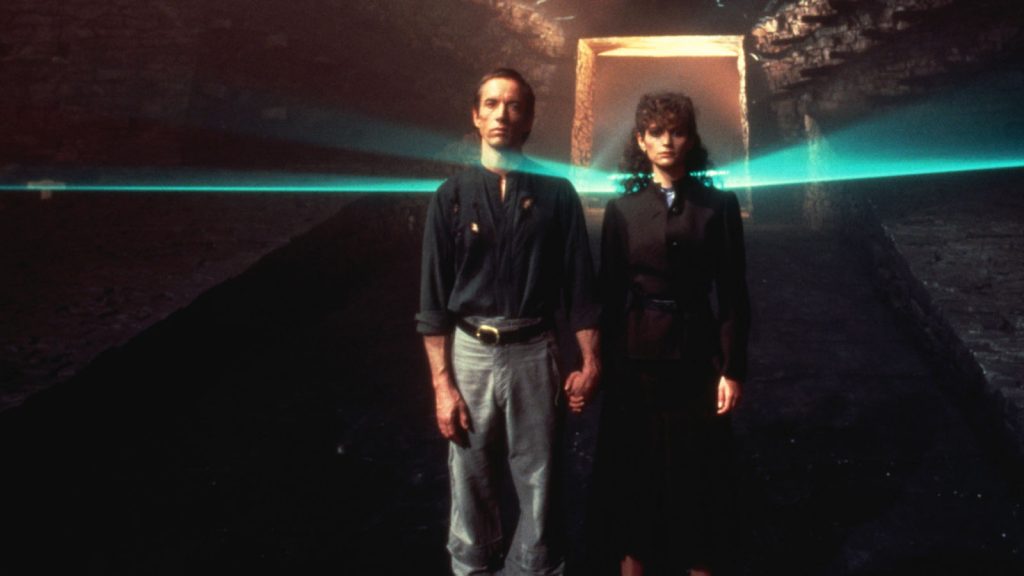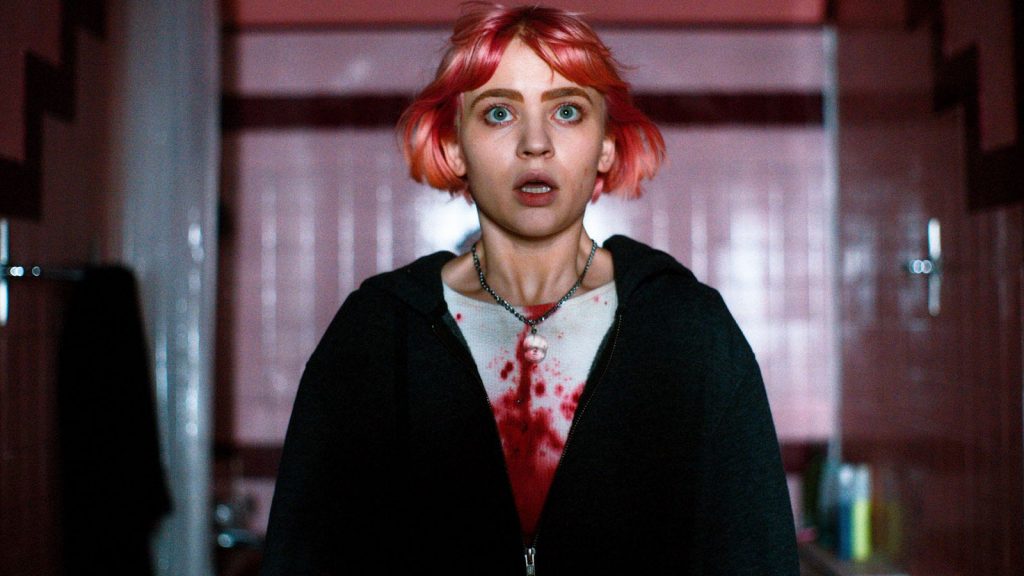
Evil father figures account for some of the most memorable characters in genre films and beyond. And, well, if you happen to have a shitty dad in real life, it’s strangely therapeutic to seek out on-screen ones who rival your own. The thick blood of family can allow fathers to get away with a lot—and bad male behavior in general has become so maddeningly normalized that a demented scoundrel can not only run for but win a presidency—but let’s stick to the movies, where the actions of even the most raving of lunatics have somehow become quainter than reality. That said, 2024 featured a few whoppers of fatherly failure so misguided that they might someday stand alongside the classic bad dads we know by their (memorable) names: Jack Torrance, Guy Woodhouse, Daniel Plainview, Leland Palmer, Anakin Skywalker, and Vito Corleone.
Though recent cinema has offered some stiff competition, the Bad Father of the Year prize must go to the greasy, gunrunning, murderous son of a bitch Lou Langston, as embodied by Ed Harris in Love Lies Bleeding. A splendid follow-up to her equally stunning feature debut, Saint Maud (2019), Rose Glass’s new, late ’80s–set slice of neo-noir is sweaty, grimy, gory, racy trash, populated with vivid characters and performances—in other words: totally amazing. Kristen Stewart, remaining typically aloof even through the most intense drama, plays the younger of two daughters to Lou Sr. and a mother who has been out of the picture for 12 years; she even has the dishonor of sharing his name. Like a girl with a past, Lou keeps a very low profile, living alone with her cat and working an unglamorous job at the local gym. She has written off Lou Sr., whom she not at all affectionately refers to on different occasions as a “fucking psycho,” a “piece of shit,” and a “sick fuck.”
Between her father’s shiny bald crown lined with horrible long locks (a style apparently known as a “skullet”) and his creeper glasses, extremely weathered skin, gruff voice, and cold blue eyes, anyone might wisely choose to remain at a safe distance from him. He’s also “the bug guy,” keeping a collection of slimy critters on hand for the occasional snack. Certain scenes capture Lou Sr. in an ominous red glow to highlight his villainy. (Ben Fordesman’s cinematography is striking throughout.) But removing this repulsive man completely from her life isn’t that simple for Lou Jr. because the FBI is trailing her, asking questions about her dad’s shady dealings.
Young Lou’s miserable little world opens up when she meets and is immediately drawn to Jackie (Katy O’Brian)—a bodybuilder passing through town, who has just picked up a waitressing gig at the gun club run by Lou Sr.—then proceeds to close in on her hard as her family’s crime connections come to a head, accelerated by the killing of her disgusting brother-in-law (Dave Franco), who regularly batters Lou’s sister Beth (Jena Malone). Lou’s plan to leave her small New Mexico town for the first time to accompany Jackie to Vegas for a bodybuilding competition and then continue west with her seems further out of reach by the moment.
Love Lies Bleeding combines elements of crime thrillers, darkly romantic fugitive love stories, and even drug-conscious message movies as Jackie gets deeper into steroids, altering her senses and the movie’s (the ending especially veers into surreality), but above all, it’s an unhinged family drama that exhilarates as Lou faces off with her dad and her past. It’s the liveliest, pulpiest movie of the year (yes, even factoring in Anora) that not enough people are talking about.

The clean-cut architect dad in Tilman Singer’s creepy, deadpan Cuckoo, another genre-bender, looks mighty civilized in comparison. Whereas Lou Sr. is obviously instant trouble, you could mistake the soft-spoken Luis Vanderkurt (Marton Csokas) for a sensitive and caring family man. His focus is fully fixed on his second, much younger wife, Beth (Jessica Henwick), and their nonverbal 8-year-old, Alma (Mila Lieu), which completely alienates the film’s heroine: Gretchen (a great Hunter Schafer), his 17-year-old daughter from a previous marriage. When Gretchen’s mom dies, the mourning teen is dislocated from America to Europe, forced to join Dad’s new little family and live at a weirdo resort in the Bavarian Alps, where strange things occur regularly.
At one point, Gretchen sustains a nasty head injury while being pursued by a hooded woman (we won’t get into the film’s fantastical creature elements), but at the hospital where Alma has also been admitted, the cops don’t believe her story, and when she tells her dad she was attacked, he’s totally dismissive as well. A running sick joke of the film is that this poor girl continually gets injured and abused physically and emotionally (though she stays strong as only an angsty teen can)—yet it’s always all about Alma. Any viewer who’s ever dealt with having golden stepsiblings will feel pangs of anger and resentment on Gretchen’s behalf. Alma may be dealing with some mysterious health issues, but no one seems to care that her big half-sister is not only bleeding but reeling with grief, still leaving messages on her mom’s voicemail for comfort, and feeling like the outsider of the family (a neighbor asks her if she’s the housekeeper). Gretchen tries hard to hate Alma, yet can’t help but be protective of her. When Gretchen ends up in the hospital again after a car accident, her face mangled, and practically begs her dad to listen, he tells her, “You’re making it very difficult for your sister.”
While the elder daughter/father relationship is not the focal point of Cuckoo, their disconnect provides perhaps the most grounded, relatable human elements of the proudly bizarre film (along with increasingly touching sister-bonding). It’s revealed that Luis has sold the family home Gretchen had hoped to return to, essentially making choices for her like she’s still a small child. Her reacting to this news by swiftly punching her father hard in the face is to me the movie moment of 2024, or maybe ever.

Going in, I had no idea that M. Night Shyamalan’s Trap was a bad-dad movie. I thought it was a “good dad protects his daughter from a killer on the loose during a massive concert” scenario, and was pleasantly surprised that that was far from the case. Seemingly gentle firefighter Cooper Adams (Josh Hartnett) is actually a life-destroyingly awful father. (Shyamalan is a great one, on the other hand, giving his daughter Saleka a quasi-heroic lead role as the fearless pop star Lady Raven, whose concert Cooper and his teenage daughter are attending—along with most of Philadelphia, it seems.) Cooper’s initially portrayed as an awkward, lovably doofy dad trying to be cool for Riley (Ariel Donoghue), yet embarrassing her by using slang words like “jelly” and “crispy.” But in their first scene together, as they drive to the concert venue, he tells her that he won’t break the law and that she should trust him—at this point in the story, we don’t yet know how ironic both of those statements are. The duo seem to have a genuinely loving relationship. A dumbass merchandise vendor is truly touched by their good family vibes.
But Cooper is, in fact, the serial killer known as “The Butcher,” with at least a dozen victims under his belt (no real spoiler here: we’re fully onto him by the film’s 20-minute mark), and the concert itself is a trap to catch him, with an alarmingly large uniformed presence (including Hayley Mills as an FBI agent) on hand to assist. Hartnett’s got that squeaky-clean, politician-like exterior that’s usually serving to overcompensate, and the too-bulked-up physique of a dude with something to prove. He’s also very shrewd at circumnavigating the trap, lying and maneuvering his way out, sometimes quite brutally.
The first half of Trap is confined to the concert arena, and it’s by far the best part of the film. When the action moves outside, the plot becomes (even more) laughably convoluted, and there are three too many endings. But inside, the camerawork is so effective, and the way DP Sayombhu Mukdeeprom lights and shoots the towering Hartnett as an even more imposing figure is what makes the movie worthwhile. He’s hiding out among thousands, but instead of disappearing among the crowd, he’s right there, kind of standing out in a spotlight of his own. And Hartnett, as the nutjob with mommy issues, has a field day playing an extreme contradiction (as his two separate worlds collide, he still reminds his family of menial tasks). His facial expressions alone are a joy to watch; his grins rival the creepiness factor of those in the Smile films. By the end, his smirk has become a madman’s chuckle. There’s nothing wrong with watching insanely stupid movies and having a blast. And when they feature fuckup fathers, I’m way more forgiving.

Even vicious vampire children can deserve sympathy. They are not of their own making. And in the case of Matt Bettinelli-Olpin and Tyler Gillett’s horror comedy Abigail’s titular heroine (Alisha Weir), who at first seems like your average ballerina child, she is a product of bad parenting, with centuries’ worth of pent-up neglect issues. The young girl is kidnapped by a ragtag group of six strangers hired to claim a $50 million ransom from her father. They go in with zero knowledge of his identity, but when word gets out, the fear factor skyrockets. Her father, Kristof Lazar, has a larger-than-life reputation so frightful that many believe him to be an urban legend. Is he a multi-aliased crime boss, the antichrist, or maybe even Dracula? The man/monster himself (played by an effective Matthew Goode) doesn’t even make a physical appearance until 10 minutes before the end of the film for a grand old face-off. Fun and forgettable, Abigail, if nothing else, proves that even with endless practice, some people just aren’t cut out for the role of fatherhood. 🩸
is a writer, editor, and horror programmer based in New York. She is the editor of Bloodvine and her writing has appeared in publications such as The New York Times, Film Comment, and Rolling Stone.
The charismatic actor Bill Paxton made his feature directorial debut with 2001’s Frailty, an unsettling, twisty thriller with noir underpinnings. Set in Texas, the film opens on an appropriately dark and stormy night...
BY MARGARET BARTON-FUMO | November 14, 2024
Years ago, on Film Comment’s website, I introduced a column called Streaming Pile...
BY LAURA KERN | December 22, 2023
It’s often said that you can pick your friends but not your family. Yet in an age of mass communication, it’s never been easier to track down an absentee dad or quietly unfriend a despicable relative on Facebook.
BY VIOLET LUCCA | October 8, 2023

This pre-Code offering packs a lot of story into its typically brisk running time, with several plot threads weaving together a (not always successful) tapestry of spooky and criminal doings.
READ MORE >
BY ANN OLSSON | Month 00, 2021

In what could be the fastest-resulting rape revenge movie, a drunken lout brutally forces himself on Ida, the young woman who doesn't return his affections, during a party over Labor Day.
READ MORE >
BY LAURA KERN | Month 00, 2021

Beast is a lot of movies in one package - fractured fairy tale, belated-coming-of-age story, psychological drama, regional horror film - but above all it's a calling card for its leading lady, Jessie Buckley.
READ MORE >
BY LAURA KERN | Month 00, 2021